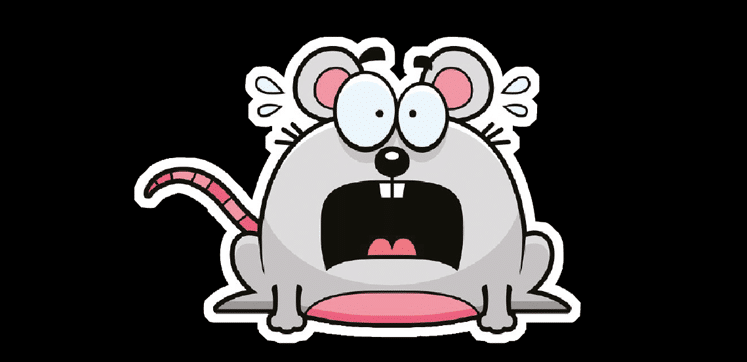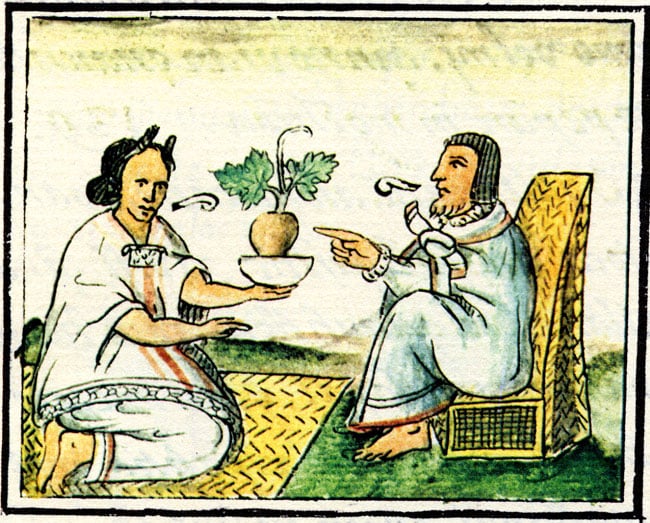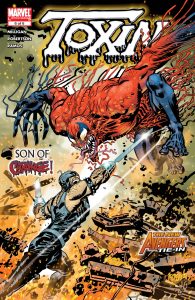
Not the ASPCA poster
I saw a poster from the American Society for Prevention of Cruelty to Animals (ASPCA) that I thought it was worth discussing. It’s about things that are toxic to horses.
And then, I started thinking that maybe we should first talk about toxin are, and what toxic means, because the terms have been thoroughly abused in modern psuedoscience. So let’s start there.
WHAT IS A TOXIN?
A toxin is a poisonous substance. A toxin is toxic that is, it’s poisonous, but not all toxic substances are toxins. A toxin is a specific product of the metabolic activities of a living organism. So, for example, sometimes, in contaminated, infected wounds, the bacterium C. tetani can set up and produce a toxin that causes tetanus (there are plenty of other examples, from other bacteria, as well as many other living organisms).
WHAT DOES “TOXIC” MEAN?
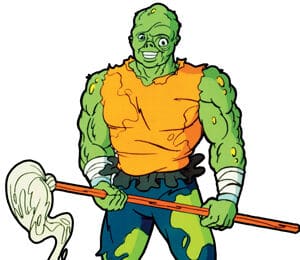
Melvin Junko
“Toxic” is just a synonym for “poisonous.” Many things are toxic – various chemicals, for example, can be quite toxic. Toxins are usually very toxic. What’s interesting about toxins is that they can cause an immune response in the body, which is why you can vaccinate against many of them; horses usually get a vaccination against the tetanus toxin, for example.
WHAT IS NOT A TOXIN?
The problem with the word “toxin” is that it’s been misappropriated by all sorts of quacks, cranks, and savvy business people (QCSBP) to sell worthless treatments that allegedly “detoxify” the horse’s body of all sorts of nastiness that is supposed to have accumulated in the course of day-to-day living. Horses’ of course, are not the only species about which this idea is pitched. So, horse owners may be advised to feed their horses apple cider vinegar, baking soda, dandelion or who-knows-what-else as a way to “cleanse” the horse’s system of, well, whatever it needs to be cleansed of (depending on the claim, of course).
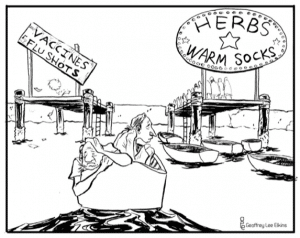 OK, THIS IS STUPID, BUT I DO NEED TO POINT OUT I’M NOT MAKING THIS UP – According to one website, if your horse needs to be detoxed, all you have to do is rub your fingers briskly over his forehead so that you get down to the skin. If your fingers get oily, it’s because the horse’s body is pushing out toxins. And you can buy stuff for that, too. Were my horse to be so beset, I’d probably buy a sponge and get it soapy and wet, but then, I’m not entrepreneurial.
OK, THIS IS STUPID, BUT I DO NEED TO POINT OUT I’M NOT MAKING THIS UP – According to one website, if your horse needs to be detoxed, all you have to do is rub your fingers briskly over his forehead so that you get down to the skin. If your fingers get oily, it’s because the horse’s body is pushing out toxins. And you can buy stuff for that, too. Were my horse to be so beset, I’d probably buy a sponge and get it soapy and wet, but then, I’m not entrepreneurial.
Of course, if toxins were building up in your horse, he’d die pretty quickly without serious and regular veterinary attention. In fact, the horse actually comes with a number of organs – kidneys, skin, lungs, liver – that actually do remove metabolic by-products with rather remarkable efficiency. And no matter how much you want to “help,” and no matter how much you’re willing to spend, there’s no known product that makes a perfectly-working healthy horse’s body work any better.
 Another thing about toxins is that you can measure them. So, if someone tells you that toxins are building up in your horse’s body, and you need to give this, that, or the other thing, start by asking them which toxins. Of course, that may not be foolproof, either, since other QCSBP have promoted bogus ideas like hair analysis to try to relieve concerned horse owners from their hard-earned money.
Another thing about toxins is that you can measure them. So, if someone tells you that toxins are building up in your horse’s body, and you need to give this, that, or the other thing, start by asking them which toxins. Of course, that may not be foolproof, either, since other QCSBP have promoted bogus ideas like hair analysis to try to relieve concerned horse owners from their hard-earned money.
Actually, when you think about it, horses sort of have the ultimate in “detox” lifestyles, since they eat plants, don’t smoke, exercise with enthusiasm and regularity. In most cases the plants – along with the microbes in the horse’s body – give the horse’s body all it needs to function perfectly. In fact, in my opinion, if someone tries to sell you something to “detoxify” your horse, you should just walk away because, well, since when are QCSBP’s authorities on horse medicine?
Now, on to the subject (finally). Here, according to the ASPCA, are the five most common toxicities of the horse.
#1 – Insecticides
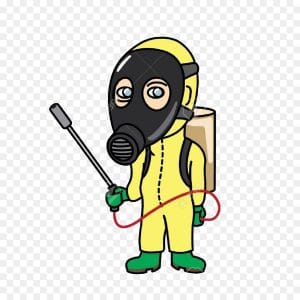 Horses and insects are seemingly inseparable. As useful as they may be for some things – removal of decaying matter, for example – bugs are, of course, a constant source of annoyance to horses and horse owners, alike. In an effort to keep everyone happier and healthier, there are many insecticides available for use on horses, as well as in the horse’s environment. Whole tack room and feed store shelves are devoted to fly sprays, for example, but insecticides such as those in ant granules can be toxic if a big enough dose is ingested.
Horses and insects are seemingly inseparable. As useful as they may be for some things – removal of decaying matter, for example – bugs are, of course, a constant source of annoyance to horses and horse owners, alike. In an effort to keep everyone happier and healthier, there are many insecticides available for use on horses, as well as in the horse’s environment. Whole tack room and feed store shelves are devoted to fly sprays, for example, but insecticides such as those in ant granules can be toxic if a big enough dose is ingested.
BOTTOM LINE? If you’re going to use insecticides around your horse, make sure to follow the instructions on the label and make sure that your horse doesn’t have access to them.
#2 – Supplements
 This one surprised me, actually. In general, most supplements – for hoof, joints, digestion, etc. – are worthless. In fact, studies have shown that some supplements don’t contain what the labels says that they contain. Add in the fact that the horse is so big – which, to a certain extent, helps protect them against small doses of toxic substances – and I would not have thought that supplements would be on the list.
This one surprised me, actually. In general, most supplements – for hoof, joints, digestion, etc. – are worthless. In fact, studies have shown that some supplements don’t contain what the labels says that they contain. Add in the fact that the horse is so big – which, to a certain extent, helps protect them against small doses of toxic substances – and I would not have thought that supplements would be on the list.
However, supplements tend to be tasty, because, otherwise, horses probably wouldn’t eat them. On the other hand, since they are tasty and horses eat like, well, horses, if horses get access to a supplement, they’re very happy to eat the whole bucket or bag. And, since the carriers for supplements tend to be easily digestible carbohydrates, a horse can potentially develop digestive problems or laminitis after eating a whole bag of the stuff.
BOTTOM LINE? If you’re going to insist on wasting your money on supplements, at least please be cautious about feeding and storing them.
#3 – Lawn and Garden Products
BOTTOM LINE? If you’re going to use products to try to kill weeds, or, alternatively, to make desirable plants grow, make sure that you follow label directions and keep your horse away from them. The last thing you want to do is accidentally poison him.
#4 – Rodenticides
 Rats and mice just love many of the feedstuffs given to horses. However, many horse owners don’t love rats and mice, so, failing having a particularly efficient cat, or an aggressive band of owls, they may turn to rodenticides to control the problem. Many of these are grain-based. This makes the rodenticides well-nigh irresistable to rats and mice, but horses have been known to enjoy grain from time to time, as well.
Rats and mice just love many of the feedstuffs given to horses. However, many horse owners don’t love rats and mice, so, failing having a particularly efficient cat, or an aggressive band of owls, they may turn to rodenticides to control the problem. Many of these are grain-based. This makes the rodenticides well-nigh irresistable to rats and mice, but horses have been known to enjoy grain from time to time, as well.
A QUICK STORY – Honestly, although I’ve certainly not looked at all of the rodenticides, based on one experience, I’m not always sure which is the bigger danger: the rodenticide or the grain. When I was first out of veterinary school, interning at Iowa State University, a horse was brought in after having eaten an entire 50 pound bag of warfarin-containing rat poison. Warfarin, if you didn’t know, works by causing bleeding. Anyway, on first blush, I thought, “This is horrible.” Finding that the horse’s owner readily agreed, I ran off to find a toxicology book to find 1) an antidote, and 2) a dose of said antidote.
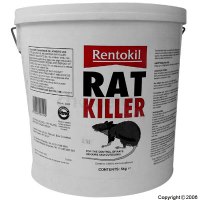 I also had access to a calculator. The client brought the bag of rodenticide with them, and, knowing the concentration of the toxin, and how much the horse ate (the whole 50# bag), I was able to calculate the dose. Turned out that the bag of rat poison, while undoubtedly packing enough poison to kill a mischief of rats (I love this, and I looked it up), didn’t have enough warfarin in it to do anything to the horse. However, in an abundance of caution, and at the owner’s insistence, I did give the horse Vitamin K, which was the antidote. And, even though the directions said to give the Vitamin K slowly, and I did, the horse got really wobbly after the vitamin K and for a couple of minutes I was afraid that even though the rat poison wasn’t going to kill him, I had (see below).
I also had access to a calculator. The client brought the bag of rodenticide with them, and, knowing the concentration of the toxin, and how much the horse ate (the whole 50# bag), I was able to calculate the dose. Turned out that the bag of rat poison, while undoubtedly packing enough poison to kill a mischief of rats (I love this, and I looked it up), didn’t have enough warfarin in it to do anything to the horse. However, in an abundance of caution, and at the owner’s insistence, I did give the horse Vitamin K, which was the antidote. And, even though the directions said to give the Vitamin K slowly, and I did, the horse got really wobbly after the vitamin K and for a couple of minutes I was afraid that even though the rat poison wasn’t going to kill him, I had (see below).
BOTTOM LINE? If you’re going to use rodenticides in the barn, keep track of which ones you’re using, and don’t let your horse have access to them.

www.savagechickens.com
VETERINARY PRODUCTS
Right. Well, the first thing that you have to understand is that if a product has an effect, it also has a possible side-effect. There are adverse reactions described to just about every effective substance given to horses, which is why you shouldn’t dose your horse with some medication without consulting with your veterinarian. However, accidents can happen, too, for example, the rings on the oral dosing syringes can slip and result in an inadvertent overdose (which, for many things, such as dewormers, may not be that big of a deal – for others, not so much).
BOTTOM LINE? Check the dose before giving your horse medication and be careful administering it.
There are many substances that are potentially harmful to your horse. Fortunately, with a little care, you can help keep your horse from getting into most of them. Toxins are a real thing, however, there’s also a lot of fake toxicology out there. Make sure you don’t confuse the two.

